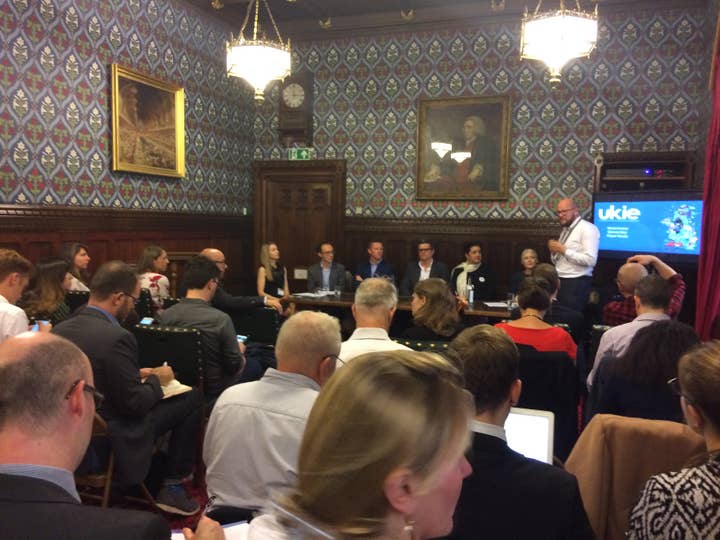Brexit fears resurface at Westminster games panel
"We're not getting a response from government that will prevent companies from deploying their contingency plans now"
A panel of games industry experts speaking in the Houses of Parliament yesterday discussed the issues they face recruiting from overseas - and how they will be exacerbated by the UK's departure from the European Union.
The sessions was part of the Westminster Games Day initiative by trade body UKIE, which invites Members of Parliament to learn more about the games industry, and companies based in the UK in particular.
While the panel began by talking about nurturing more talent from within UK shores, the conversation quickly turned to the importance of bringing in skilled workers from abroad.
"We give everyone every reassurance we possibly can that we'll do whatever it takes [to support them], but we don't know what's going to happen"
Gareth Edmondson, Creative Assembly
John Clark, Sega's SVP of commercial publishing, observed that his department doesn't set out specifically looking for recruits overseas but inevitably finds that's where the best recruits are.
"It just so happens that more than 50% of our analytical team are often foreign nationals, and that's because they have the skills to dig deeper and a better technical understanding," he told attendees. "Having access to that is something that is developing our entire business and improves our standards across the board."
Gareth Edmondson, COO at Creative Assembly, added: "The skills shortage is well understood. CA has over 30 per cent overseas staff, [encompassing] 35 different nationalities. We have to go overseas for that talent. It's not that we're not working with local education establishments, it's not that we're not happy to see coding has gone onto the curriculum - all of that stuff is good, and we do what we can with it, but we have to bring these people in from overseas.
"Anecdotally, four or five people have turned us down because of Brexit. We've had a couple of people leave because they're worried about the future. We give everyone every reassurance we possibly can that we'll do whatever it takes [to support them], but obviously we don't know what's going to happen.
"We need to find ways to bring those skills in, and it's not just programming; it's audio, leadership, artists, animators, business analysts. It's every aspect and we need to pull the best in."
"Most companies like to plan two to three years ahead, but we're living with a level of uncertainty at the moment."
Giselle Stewart, Ubisoft
Giselle Stewart, director of corporate affairs at Ubisoft, told a similar story. She gave the example of the publisher's attempts to break into the South Korean marketplace a few years ago and the difficulties of bringing someone from that region into the fold.
"We lost him during the process of bringing him in because that visa process was so unwieldy. Within the two or three months it took to get the visa he lost confidence in the company and went somewhere where it was easier for him to work," she said, before expressing concerns about how Brexit may make hiring from much closer nations just as difficult.
"The last thing we want is to have the system we've already got for the rest of the world to apply to EU nationals going forward. It needs to be as easy as possible, as seamless as possible. Most companies like to plan two to three years ahead, but we're living with a level of uncertainty at the moment."

Brexit negotiations are currently underway, with EU member states due to meet and discuss their progress on Thursday October 19. Yesterday, UK Prime Minister Theresa May agreed with EU Commission President Jean-Claude Juncker to "accelerate" the negotiations, but the games panel believe progress is already too slow to prevent companies losing valuable new recruits to international rivals.
UKIE CEO Jo Twist added: "We are facing huge competition globally... The changes [to the immigration system] that were brought in April, along with the apprenticeship levy, in the lens of Brexit [make things] extremely difficult - particularly for the majority of games companies, who are in fact small companies. They can't take the burden of that extra financial layer and take the time it takes to go through this entire painful process before the person [they're hiring] is snapped up by another company in America, Canada or somewhere else."
"We're not getting the response from government that is satisfying enough to prevent companies from deploying their contingency plans now."
Jo Twist, UKIE
The aim of the panel was to raise these concerns to Members of Parliament, but a quick show of hands revealed only one had actually attended - despite the session being held within the Houses of Parliament itself. The attending MP - Warwick and Leamington's Matt Western - recognised that Brexit will have strong implications for multiple industries, and commended the games sector for highlighting these.
"I've been talking to other industry sectors about the challenges in the face of Brexit, particularly for those sectors trying to attract the best from around the world," he said. "This uncertainty is just sending shockwaves through certain categories.
"Please do everything you can to lobby, as I will do from inside. You have to [because] there are so many people in [Parliament] who have not actually been in an industrial sector of any scale, and they do not understand the time leads that you work to in terms of bringing people in, or that visa process that we need to be smarter about.
"I'm surprised so many categories aren't shouting at Parliament because this is massive, what's about to happen. They have to understand how critical all this in terms of the time it takes [to hire from overseas]."
Twist pledged that UKIE would continuing campaigning for processes that would better benefit the games industry and maintain, or ideally improve, its contribution to the UK economy. However, she observed that despite all the economic analysis and statistical evidence her organisation and the wider industry has provided, it is often met with apathy.
"The response from government needs to be there," she said. "We're not really getting the response from government that is satisfying enough to prevent companies from deploying their contingency plans now."

The panel also touched on how to encourage more young people to work towards a career in the games industry. The panellists agreed that more effort needs to be made reaching out to schools and assured developers that doing so would help forge important connections for the industry.
"Schools really want to work with you," said Shahneila Saeed, programme director for Digital Schoolhouse. "They want to work with people in the industry, but they find it very hard to do so. They don't know who to get in touch with, whether you guys will want to speak with or work with them. They don't know what they can ask of you and what you can bring.
"There are multiple ways the industry can interact with schools, whether that's through speakers visiting schools, whether it's through students visiting your studios, or working with schools to develop resources using your expertise. It's not just one medium that's going to work; it's about providing multiple opportunities because we don't want a flash in the pan. We don't want to inspire students for just 48 hours, and then when the next big thing comes into schools you're gone. It's about having continued and sustained engagement, having repeated exposure. So if you can find ways to be more obvious to teachers, in your own marketing or on your own websites, see what you can do."
Twist said that despite the number of best-selling games made in the UK and the number of companies based here - over 2,175, in fact - there is still a perception problem about how those outside the games sector view the business.
She added: "The fact of the matter is we still have many, many, many schools and government departments who still block any URL that has the word 'games' in them. That is a basic battle we still need to overcome before we can even get to the perception issue."
When it came to closing remarks, Twist stressed the importance of skills and talent - whether domestic or from abroad.
"Our ability to attract the best talent, to retain the best talent will determine our future as an economy, a society and a culture - that is the bottom line," she said. "Any suggestions how we can shout out that message even louder and actually get people's attention - including mainstream media - would be very much welcome."








